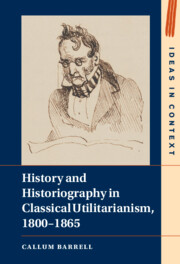4 results
III.1 - After the Principia
- from Part III - Isaac Newton and the Emancipation of Natural Philosophy from Metaphysics
-
- Book:
- The Kingdom of Darkness
- Published online:
- 23 March 2022
- Print publication:
- 31 March 2022, pp 577-652
-
- Chapter
- Export citation
Chapter 1 - Jeremy Bentham on Historical Authority
- from Part I - Enlightened Historicisms
-
- Book:
- History and Historiography in Classical Utilitarianism, 1800–1865
- Published online:
- 24 September 2021
- Print publication:
- 07 October 2021, pp 23-58
-
- Chapter
- Export citation

History and Historiography in Classical Utilitarianism, 1800–1865
-
- Published online:
- 24 September 2021
- Print publication:
- 07 October 2021
5 - Science in the Scottish Enlightenment
-
-
- Book:
- The Cambridge Companion to the Scottish Enlightenment
- Published online:
- 04 October 2019
- Print publication:
- 26 September 2019, pp 90-112
-
- Chapter
- Export citation

